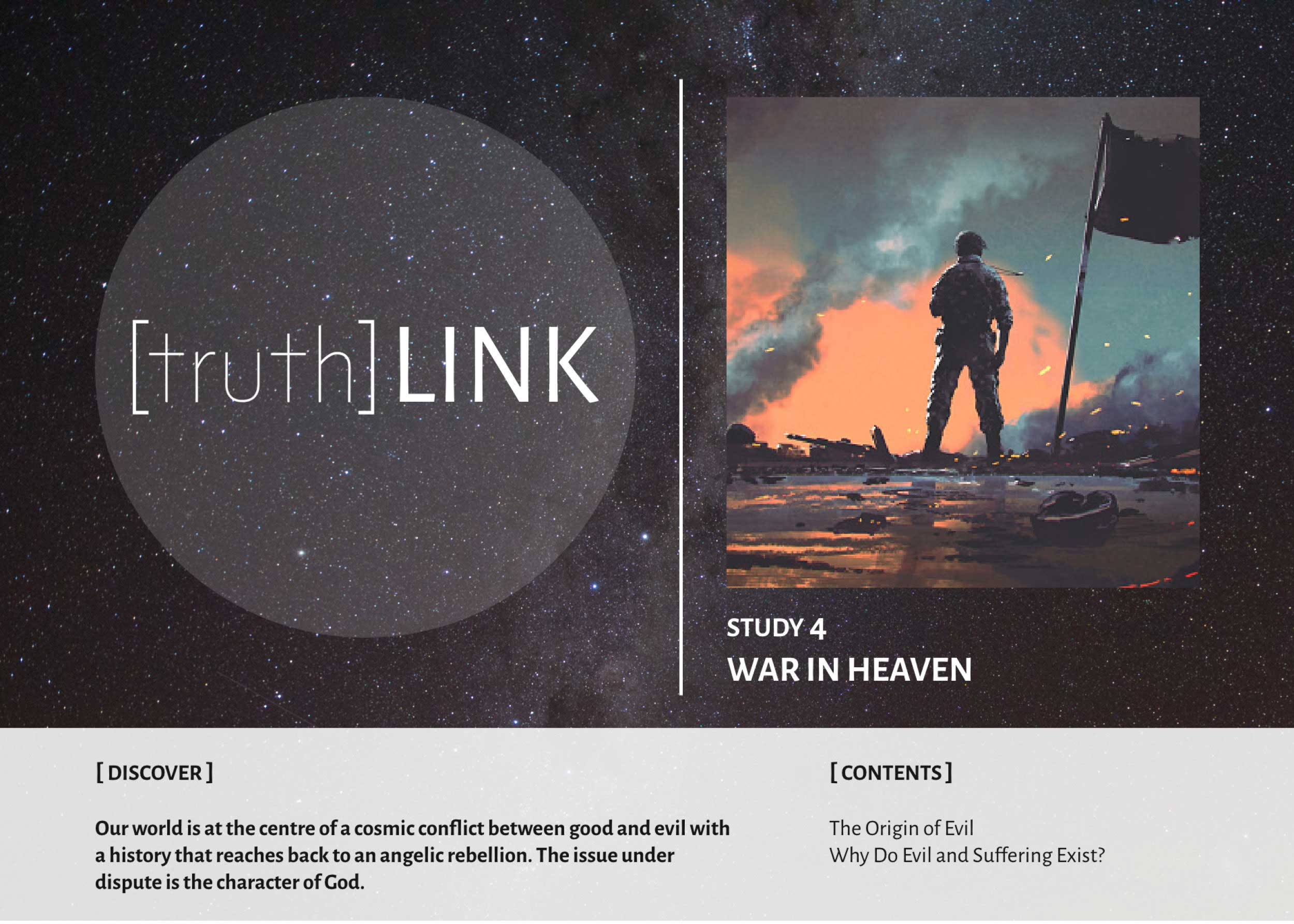
The Origin of Evil
The Bible teaches that we humans are not alone in the universe as the only rational, sentient, freewill creatures. From Genesis to Revelation we encounter an order of beings called angels. We know from Scripture that the angels predate the existence of humans (Job 38:4-7; Revelation 1:20), that they are numerous (Hebrews 12:22), powerful and intelligent (Psalm 103:20; Daniel 4:17), that they function within an orderly system of governance under appointed leaders (Ephesians 3:10; Daniel 7:9-10), that they actively operate within our world, mostly unseen, but sometimes in visible form (Hebrews 1:14; 13:2), and that the reality of evil that afflicts our world originated with them (Revelation 12:7, 12).
One of the angels was “Lucifer”—bearer of light—a name bestowed upon him by his Creator to signify his character and mission. This exalted being was to occupy a position of intimacy with God and thus to be a preeminent revealer, a teacher of God’s character to his fellow angels. Lucifer was “perfect in all” his “ways” (his patterns of thought, feeling, and behavior), “until iniquity was found in” him. At this point he began to bear the name “Satan,” which means adversary. While the image of Satan has been trivialized and fictionalized into a cartoonish red man with horns and a pitchfork, the biblical picture is of a super powerful, highly intelligent, magnificently beautiful, and totally non-fictional fallen angel who is the originator of the very real evil that haunts and hurts our world.
Read and discuss Isaiah 14:12-14 and Ezekiel 28:12-19. On a separate sheet of paper compose a character profile of Lucifer.
Self-exaltation was the worm at the core of the evil that Lucifer chose to actualize in himself, leading to the heady aspiration to displace God from the hearts of his fellow angels and usurp their loyalty. As Lucifer nurtured self-centeredness in himself, he ceased to reflect the light of God’s character and began to attribute to God his own self-serving motives. The aspiration, “I will exalt” myself, followed by, “I will be like the Most High,” indicates that Lucifer began attributing self-exaltation to the character of God as justification for his own. By denying the essential goodness of God’s character, Satan’s course of action was calculated to erode trust toward God and incite rebellion against Him.

The word here translated “war” is polemos in the Greek, which is related to words like polemic and politics. This clues us in on the precise nature of the “war” Satan launched against God. It was not primarily a war of physical engagement or force of arms. It was a political war, a propaganda campaign, a character assassination scheme. Satan waged his war by disseminating lies regarding who God is at heart. Thus he is described as the one who “deceives the whole world” and as “a liar and the father of it” (Revelation 12:9; John 8:44).
Put these pieces together and you will discover additional insight into the core issue involved in Lucifer’s rebellion:
Ezekiel says that Lucifer was cast out of heaven because he “sinned” (Ezekiel 28:16).
John defines sin as “lawlessness” (1 John 3:4).
And Paul defines God’s law as “love” (Romans 13:10).
Clearly, then, Lucifer rebelled against God’s law and, therefore, against God’s love. He raised charges against God and against the law of love by which God governs the universe. Whereas the Bible claims that “God is love” and that His law is, therefore, a law that governs by the principles inherent in love (1 John 4:8; Matthew 22:37-40), Satan has set out to live without love. It serves his purpose, therefore, to portray God as self-exalting and His law as a list of arbitrary rules imposed for purposes of control, but not necessarily as a way of life.
Why Do Evil and Suffering Exist?
At some point in life, every human being asks the most pressing and significant of all questions: “Why do evil and suffering exist?” In what we’ve discovered regarding the rebellion of Lucifer we have the starting place for the answer to the question. Now let’s go a little deeper by first considering the fact that within the entire scope of human thought only four basic explanations for the existence of evil are offered:
1 NATURALISM [ THE ATHEIST WORLDVIEW ] says that there is no such thing as evil as a moral category. All there is, is natural process. Suffering is part of that process and is necessary for the evolution of the strong and the elimination of the weak.
2 PANTHEISM [ THE GOD-IN-ALL-AS-ALL WORLDVIEW ] says that there is no personal God, but rather that nature itself and the natural processes of life constitute an impersonal divine force. Evil is viewed as a balancing force in nature and suffering as the inevitable process of the wheel of life. As in naturalism, there is nothing other than natural process.
3 DETERMINISTIC THEISM [ THE CONTROL WORLDVIEW ] says that God’s main characteristic is power and His main objective is control. God predetermines all events, and human beings are merely the subjects upon which His will acts. Evil and suffering are, therefore, ordained by God according to His sovereign will.
4 BENEVOLENT THEISM [ THE RELATIONAL WORLDVIEW ] says that God’s main characteristic is love and His main objective is that we would be voluntary reciprocators of His love. Evil and suffering are, therefore, ultimately the result of the misuse of freewill for chosen anti-love purposes.
The Bible clearly teaches the fourth option by claiming that love is the fundamental essence of God’s identity. It logically follows from the premise that “God is love,” that God is a relational being whose very existence is defined by a dynamic flow of giving and receiving. It further follows that if love is the essence of God’s character, then love must be God’s objective for us, which necessitates that freewill must be granted to us—literally built into the system of life—in order that love may occur. It becomes evident, therefore, that in seeking to answer the question of evil’s existence, a basic three-part equation logically emerges:

The risk inherent in freedom with its ideal of love is that free moral agents with their majestic potential for love might choose selfishness instead. God lives within that risk, as do we, with all its glorious possibilities and horrific dangers.
In biblical thought, evil is not an eternal principle inherent and necessary to the operations of reality, nor is it God’s will. Rather, evil is the product of personal free moral agency gone bad, first with angels, and then with human beings. Speaking of the evil in our world, Jesus said, “An enemy has done this” (Matthew 13:28). In other words, God is not the source of the bad things in our world. Rather, Satan is, with human consent and cooperation. Thus Satan’s anti-love mode of existence was implemented in our world: “God made people good, but they have found all kinds of ways to be bad” (Ecclesiastes 7:29, NCV).
READ AND DISCUSS ISAIAH 14:15-17, REVELATION 12:12, 1 PETER 5:8, AND ROMANS 1:28-32 to discover that all evil, oppression, enslavement, prejudice, hatred, violence, abuse, and everything else contrary to love, has its origin in the principles of Satan’s kingdom.
Then READ AND DISCUSS JAMES 1:17 AND GALATIANS 5:22-23 to discover that everything pure, lovely, liberating, noble, healing, peaceful, joyous, and beautiful has its origin in the principles of God’s kingdom.
This brings us to the final point of the Bible’s logic regarding evil, and it is this: because evil is fundamentally contrary to the character of God and to the natural operations of His love, it is temporary and will ultimately be eliminated:
“For evildoers shall be ______ _____; but those who wait on the Lord, they shall inherit the earth” (Psalm 37:9).
“They shall not _______ nor _________ in all My holy mountain: for the earth shall be full of the knowledge of the Lord, as the waters cover the sea” (Isaiah 11:9).
As we continue our study of Scripture, truth by truth, point by point, we will discover God’s plan for eliminating evil and restoring other-centered love to human hearts as the only principle of our existence.
[CONNECT]
Jesus went to battle against Satan on our behalf and demonstrated the superiority of love over evil.
There are two kingdoms, two antagonistic principles, two diametrically opposite motives contending for the mastery of our world and every human heart. Jesus leads the kingdom of truth and love. Satan, the adversary of all that is good and beautiful and true, leads the kingdom of deception and selfishness.
A comparative illustration was offered by Christ: “When a strong man, fully armed, guards his own palace, his goods are in peace. But when a stronger than he comes upon him and overcomes him, he takes from him all his armor in which he trusted, and divides his spoils” (Luke 11:21-22). The “strong man” represents Satan, but Jesus claims to be “stronger than he.” Satan’s kingdom is based on deception, self-exaltation, and violence. Jesus’ kingdom is actuated by truth, selflessness, and non-coercive love. When Jesus suffered the murderous rage of humans and demons at the cross without responding in kind—responding, in fact, with only self-giving love—Satan’s kingdom was conquered and his accusations against the character of God were proven false. By voluntarily dying on the cross with unyielding love for His enemies, Jesus defeated evil in principle and set in motion a course of redemption that ensures its ultimate defeat.
[EXPERIENCE]
I understand that we are involved in a war between good and evil and that Jesus is the Heavenly Warrior sent with truth and love to rescue us.
Jesus came to our world to “destroy the works of the devil” (1 John 3:8). Any who so choose may be empowered by His love to break free from the bondage of Satan. By His life and death Jesus ignited a revolution of truth and love that will finally vanquish evil. It lies with each of us to allow Jesus access to our lives so that the devil’s deceptive power may lose its hold on us.
Phone 1300 300 389























